Toys aren’t just child’s play. Mattel, Lego and others find ‘kidults’ bring in big business
Jeremy Hart played with Hot Wheels as a kid, but he eventually grew out of them, tucking the miniature cars away in a toolbox.
Then nostalgia struck when he attended the Hot Wheels convention in California with his son three years ago.
“I get these little glimmers and glimpses of memories and feelings when I look and see those Hot Wheels from my childhood,” Hart said.
Today, the 48-year-old has fully embraced his inner child. He has spent hundreds of dollars on Hot Wheels and is always on the hunt for new ones that replicate vehicles he’s owned or that were featured on TV shows he watched when he was younger, such as “The Fall Guy” and “The Dukes of Hazzard.” Hart proudly displays his collection at Dent Express, the auto body shop he started in Torrance.
Hart is part of a growing number of adults who are buying toys for themselves, reclaiming memories from their childhood and showing off their fandom on their desks and shelves. Some have managed to cash in on their obsessions, building up lucrative followings of toy fans online.
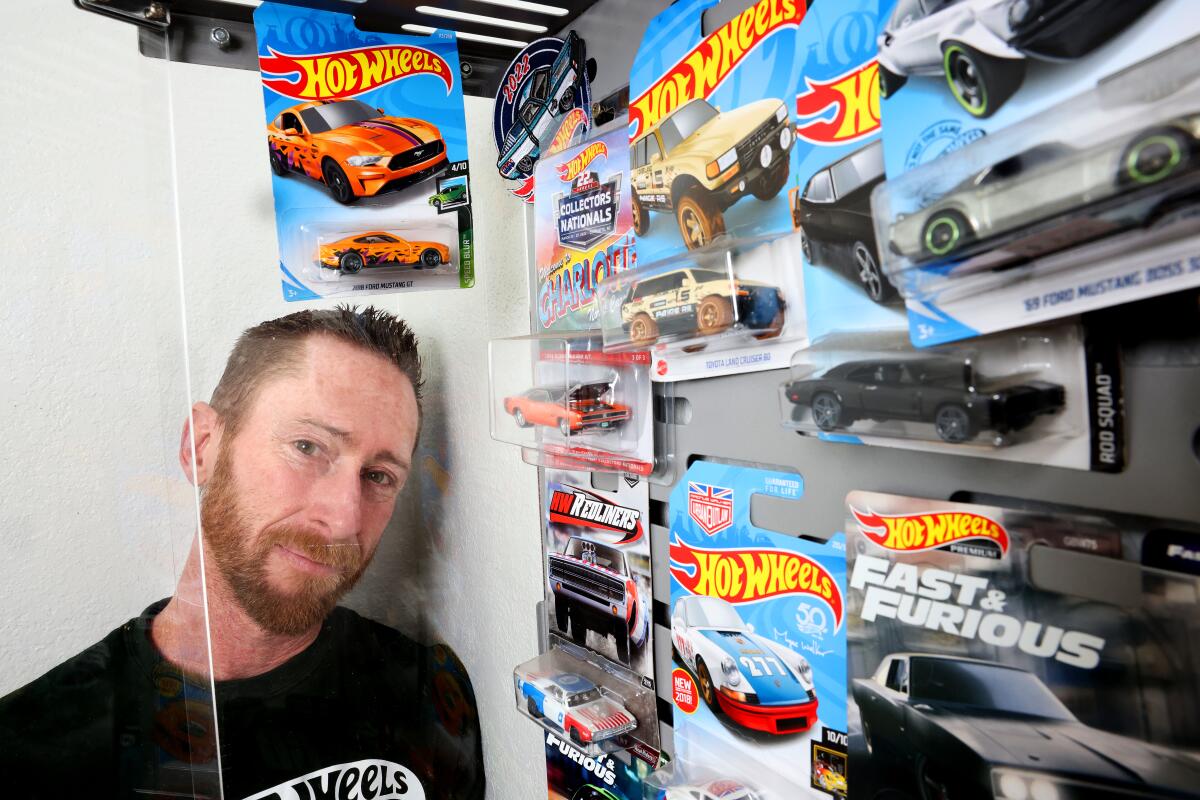
Hot Wheels collector Jeremy Hart.
(Christina House / Los Angeles Times)
Toy companies including Mattel, the Lego Group, Hasbro and MGA Entertainment have taken note of the rise of these customers known in the industry as “kidults” and increasingly are making toys with them in mind.
Mattel President and Chief Commercial Officer Steve Totzke said that while the El Segundo-based company has long counted adults among fans of its major brands such as Hot Wheels and Barbie, sales to adults have grown over the last few years. Depending on the brand, he said, adult collectors can account for up to 25% of sales.
“I’m just thrilled that the rest of the industry and society is catching up, because I do believe that play is essential and you should be enjoying toys and joy at all ages,” said Totzke, who has worked at Mattel for more than 20 years.
During the COVID-19 pandemic, U.S. toy companies saw sales surge as people stuck at home looked for activities to do. While overall growth has since slowed, sales to people who are at least 18 years old and buying toys for themselves are still going strong, data from market research firm Circana show.
In the 12 months ending June 2024, U.S. adults tallied more than $7 billion in toy purchases, the figures from Circana show. Some of the top-selling toys for adults include Pokémon, Star Wars, Lego Star Wars sets, Funko Pop! and Squishmallows. From January to April, adults bought more toys than any other age group, surpassing preschoolers for the first time, according to Circana.
In the second quarter, from April to June, sales for adults ages 18 to 34 grew by 10%, while sales for ages 35 and older grew by 9% compared with the same period last year.
Azusa Sakamoto, a 42-year-old nail artist and Barbie superfan, started collecting Barbie dolls and all the accessories and decor tied to the doll when she was a teenager. Known as Azusa Barbie, Sakamoto views Barbie as more of a “fashion icon” than a toy. Some people love Chanel. She loves Barbie.
“I just buy whatever I like, you know, whatever makes me happy,” she said. “I don’t think … age matters.”
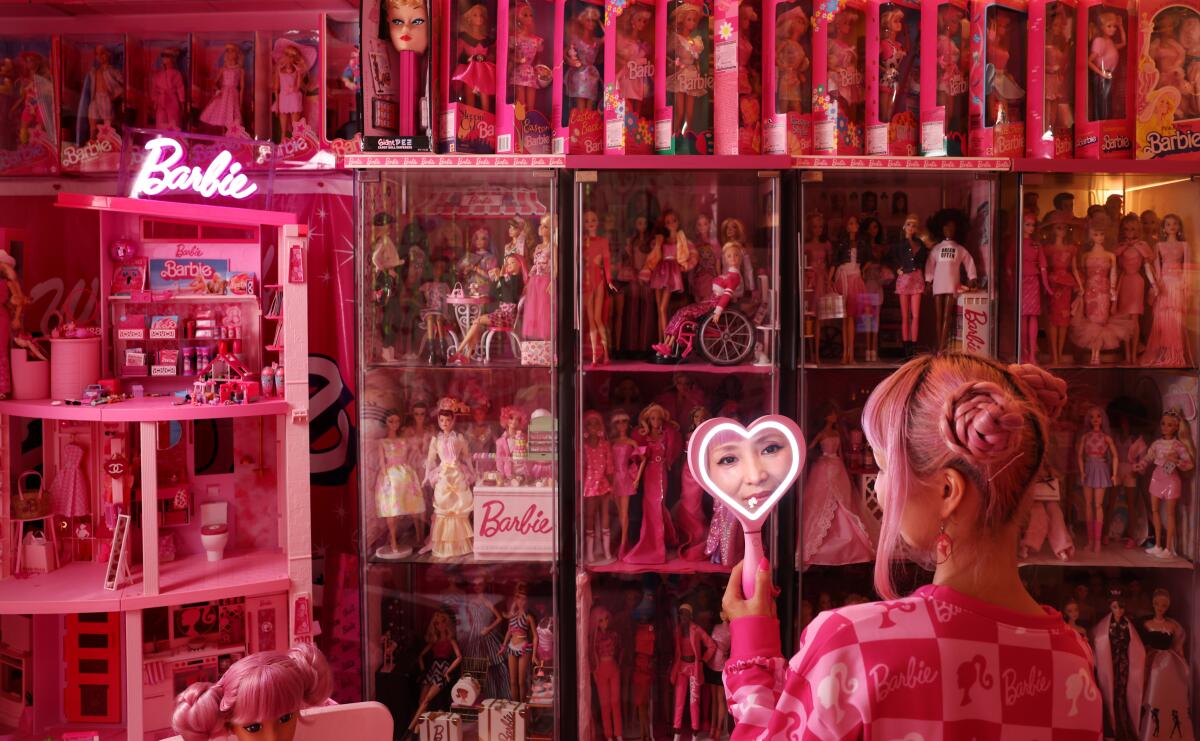
Barbie collector Azusa Sakamoto.
(Christina House / Los Angeles Times)
Inside her West Hollywood apartment, Sakamoto is living in a Barbie world. Rows of Barbies line pink walls. There’s a Barbie fridge, Barbie window shades and a Barbie nightstand.
Pink-haired Sakamoto said she relates to Barbie’s optimism and independence. She estimates she owns more than 600 Barbies and 300 Barbie shirts, sharing her fandom and recent purchases on social media.
Roughly 43% of adults in the United States bought a toy for themselves in the last year, Circana found in a 2024 survey. Some of the top reasons adults said they bought toys were for socialization, enjoyment and collecting. Others responded they purchased toys to escape from reality, display in their homes or as investments.
Harrison Woodward said receiving a Lego Technic set of a model car reignited his childhood interest in the plastic building pieces that can be connected to make intricate creations.
“I was hooked after that,” he said. “I loved the sense of peace that it gives me. … They’re like 3-D puzzles.”
He’s now spent close to $20,000 on Lego sets, with the majority of the purchases made within the last year. After his videos of him buying, building and showcasing Lego sets went viral on TikTok, the 26-year-old began earning payments from the social media platform; he also struck sponsorship deals with retailers and other companies.
The Arizona resident said he makes enough money from his Lego venture that he was able to quit his insurance job several months ago to create online content full time. On TikTok and Instagram, some of his videos rack up millions of views featuring replicas of the Titanic, the Eiffel Tower and the Great Pyramid of Giza.
Kathy Hirsh-Pasek, a professor of psychology at Temple University, said playing with toys as an adult can be beneficial, helping people foster curiosity, creativity and communication. Adults should be wary, though, if they’re buying dolls as a replacement for making friends in real life.
With people experiencing heightened feelings of loneliness, depression and anxiety while spending more time scrolling on their smartphones, it’s chipped away at social connections adults make, she said.
“They can’t be a substitute for humans,” she said. “But if these toys become a way to get humans to play with other humans again, I’m all for it.”
Juli Lennett, vice president and industry advisor, toys, for Circana, said social media has made it easy for people to find others with the same interests, making it more socially acceptable to buy toys as an adult. Some adults who question whether buying a doll house they never had as a kid is healthy behavior have found reassurance from toy enthusiasts online.
1
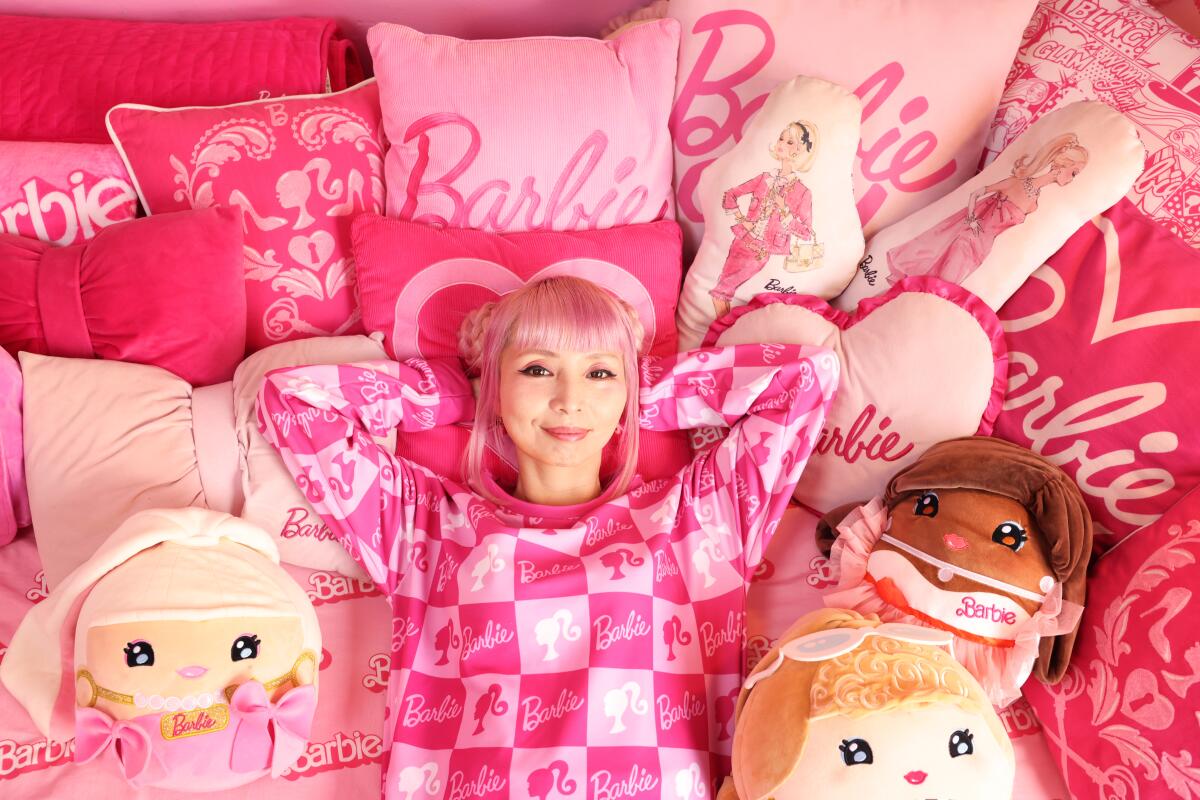
2
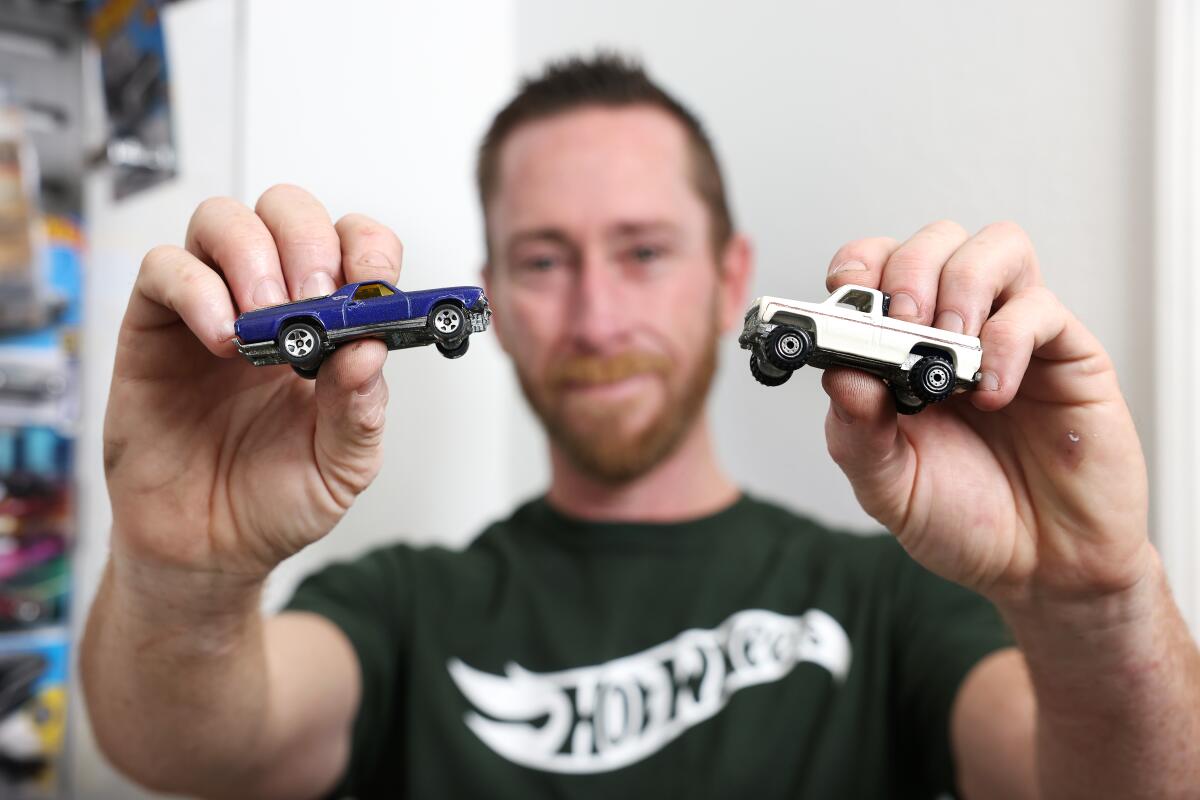
1. Barbie collector Azusa Sakamoto. 2. Hot Wheels collector Jeremy Hart. (Christina House / Los Angeles Times)
Social media star Charli D’Amelio has shown off her Squishmallows collection on Instagram. Olympic rugby player Sammy Sullivan is a mega-fan of Lego sets. SAG-AFTRA President Fran Drescher brought a heart-shaped plushie to union bargaining sessions. When Fisher Price unveiled a Little People Collector Britney Spears set in September, blogger Perez Hilton posted “NEED this!” on X, formerly Twitter.
“There is that opportunity to really think about the audience and create more toys that we’ve never seen before for that more adult audience,” Lennett said.
On Mattel Creations, a website for collectors, adults can find limited-edition collectibles that are of higher quality than toys designed for kids.
Several of the items on the site were listed recently as sold out, including a $300 Shogun Warriors Skeletor figure that stands more than 2 feet tall, a miniature $200 Porsche 930 in a display case modeled after a white sculpture by artist Daniel Arsham and $30 brightly colored Magic 8 balls decorated like an astronaut Barbie or a Hot Wheels race car driver.
In 2020, Mattel released a $400 remote-controlled Tesla Cybertruck with a vinyl “cracked” window sticker — a nod to when Tesla CEO Elon Musk smashed the “bulletproof” window on the car.
“There’s an aspect of designing for rarity, and then there’s also an aspect of modern play,” said Chris Down, Mattel’s chief design officer. When designing toys, Down said he and his team at Mattel ask themselves, “How are adult consumers not just playing with something the way that you would play with it as a kid but also playing all the way through to displaying?”
Mattel has partnered with artists, an Italian design company, a streetwear brand and others on toys and products. It has tapped into cultural and entertainment draws such as “Harry Potter,” Pokémon, “Wicked” and the hit television show “Breaking Bad,” creating new figurines based on their characters. The company teamed up with Formula One to build new F1-themed Hot Wheels and has released Little People NFL collector sets. The popularity of the 2023 “Barbie” movie, which grossed more than $1 billion at the box office, drove sales for the dolls.
Mattel reported net sales of $1.08 billion in the second quarter, down 1% compared with the same period last year. Net income surged to $57 million, more than doubling the total from the previous year.
The Lego Group also has been embracing adult buyers, some of whom call themselves AFOLs (Adult Fan of Lego). On the Lego brand’s website, replicas of the Mona Lisa, cars, plants and more are featured online with the words “Adults Welcome.”
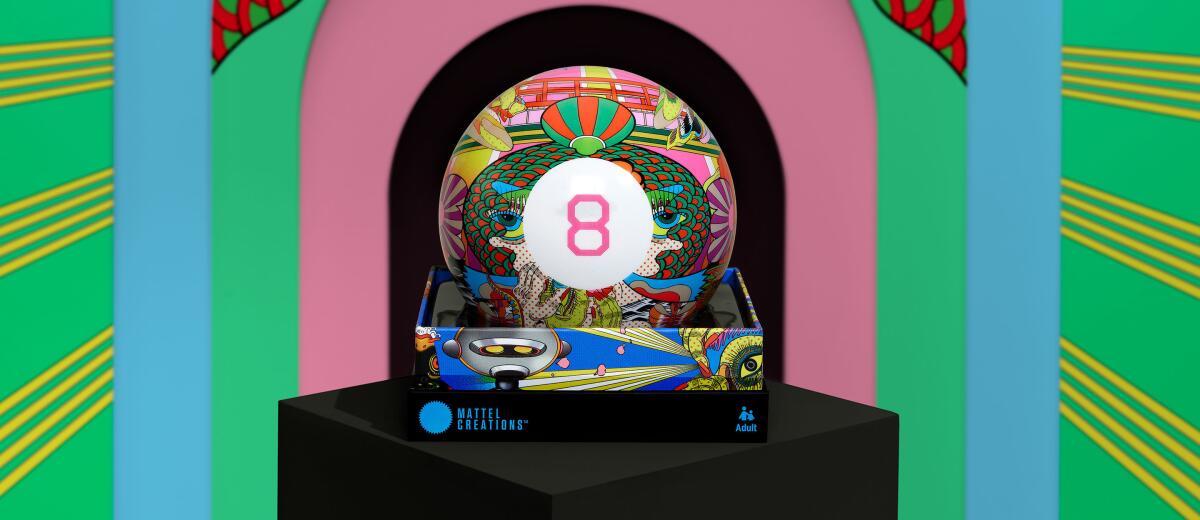
Mattel partnered with Japanese pop artist Keiichi Tanaami on several toys including the Magic 8-Ball.
(Mattel)
Genevieve Capa Cruz, senior marketing director for adults at the Lego Group, said the company expects sales for both adults and kids to grow.
“Consumer research shows that when adults are building with Lego bricks, they also tend to gift it more to the kids in their lives, and encourage building together, which makes it an even more enjoyable activity for everyone in the family,” she said in a statement.
Other toy companies also have been attracting adult buyers, offering them ways to customize their toys.
MGA Entertainment, the Los Angeles-based company that makes Bratz dolls, sells mini do-it-yourself collectible sets, including one in which fans can make their own wizarding potions from “Harry Potter” or weapons from “The Lord of the Rings.” The company’s Miniverse collection also offers the chance for adults (21 and over, please) to make mini cocktails.
“People love the detail that goes in the toy. It’s like collecting a piece of art,” said Isaac Larian, founder and chief executive of MGA Entertainment.
Adults make up about 15% to 20% of the company’s sales, he said. Those between the ages of 18 and 35 represent the company’s “sweet spot,” but its consumers also can be older. MGA is promoting a Kylie Jenner Bratz doll, and it started releasing dolls based on characters from the “Mean Girls” films this month. Both are targeted at young adults.
Hot Wheel collectors like Hart plan to purchase more toys.
“It’ll probably be never-ending for me,” he said. “Once I move up to the next-size display case, I’m gonna have a bunch of real estate to fill.”